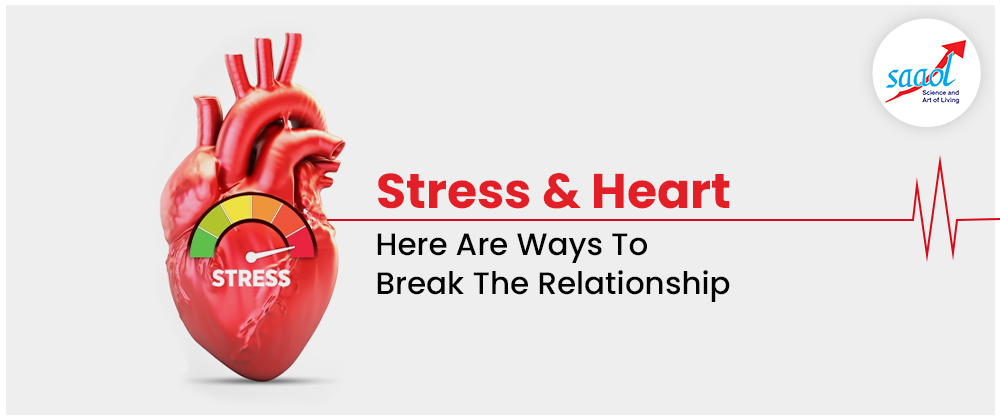Stress And Heart: Here Are Ways To Break The Relationship
SAAOL
- July 15, 2022
- 5 Min Read

We all know that stress can have negative effects on our physical and mental health, but did you know that it can also take a toll on our heart health? In this article, we’ll explore five ways to break the relationship between stress and heart health.
Stress and heart Relationship
From young adults to old-aged people all have some kind of stress. This could be due to work where they require to spend long hours, have tight deadlines, and have demanding bosses and co-workers. Other reason for stress includes financial problems, relationship issues, and health concerns.
As we are very well aware of the fact that stress can have a negative impact on our health, especially the heart. Do you know in some cases even have a minor stress-triggered heart attack. Well, the underlying issue was persistent stress.
If stress is persistent and prolonged it can cause high blood pressure, chest pain, and irregular heartbeats. This is because it makes the heart work harder and this can lead to an increase in blood pressure. It can also make it difficult to sleep, which can lead to more stress.
We at SAAOL, Science and Art of Living, offer a natural bypass treatment called EECP. Through non-invasive treatment, we help our patients get relief from angina episodes. At our centre we have witnessed that every person copes with stress in their own way. Some lean on toxic habits like smoking and drinking (which in turn increases the risk), but some might lean on exercises and meditation.
Well, if you belong to the second set of people then you are already on your path to a stress-free and healthy life but if you are someone from set one then we have 5 ways that will help you reduce your stress and risk of heart diseases.
There are several things that you can do to break your relationship with stress. First, try to identify the things that cause you stress. Once you know what your triggers are, you can try to avoid them or manage them better.
Second, make sure to take care of yourself physically. Eat a healthy diet, exercise regularly, and get enough sleep.
Third, learn how to cope with stress in a healthy way. You may try deep breathing exercises, relaxation techniques, or journaling.
Fourth, seek professional help if your stress is severe or if you are having difficulty managing it on your own.
Common Signs of stress
There are many signs that can indicate that someone is stressed. Some physical signs of stress include tense muscles, headaches, and a racing heart. People who are stressed may also feel anxious, irritable, or have difficulty sleeping.
Some psychological signs of stress include feeling overwhelmed, feeling like you can’t cope, and feeling hopeless. If you are experiencing any of these signs, it is important to take steps to reduce your stress levels to lower the further risk of heart problems.
Exercise
Exercise is a great way to reduce stress. Endorphins, which have mood-enhancing effects, are released as a result. Additionally, it aids in lowering the body’s levels of stress chemicals like cortisol.
Aerobic exercise is particularly effective at reducing stress. This includes activities such as walking, running, swimming, and biking. Aim to get at least 30 minutes of aerobic exercise per day.
Strength training exercises can also yield similar results. It can also help to improve sleep quality, which can further reduce stress levels.
Talk to your Peers!
A strong support system is a key of managing stress. Relatives, close friends, or even a therapist might be involved. These people can provide a listening ear and help you in solving the problems causing stress. It’s important to have people you can rely on when times are tough.
Make yourself a priority
It’s important to be proactive about stress management. This means setting aside time each day to relax and decompress. It might also mean saying “no” to commitments that are too overwhelming. It is important to take care of yourself.
Make time for relaxation
Make sure to schedule some time each day to relax and unwind. This can help you reduce your overall stress levels. Try activities like reading, yoga, or meditation.
Manage your time effectively
Time management can be a key factor in reducing stress. Every day plan and schedule your day. This can help you feel more in control of your life and less stressed overall. This will also help you in making time for things you love.
Try to set achievable goals
There are a number of ways to reduce work stress. One way is to set realistic goals for yourself and your team. If you’re constantly setting unrealistic goals, it’s going to lead to stress. Try to set achievable goals that you can reasonably accomplish.
Stress can be difficult to manage but not impossible. Taking steps every day can be significantly helpful. With proper stress management, you can not only keep your heart healthy but also lead a healthier life. Diet management and regular yoga practice are also some good options.
Always remember that a bunch of minor lifestyle choices can lead to heart problems rather than a major factor.
